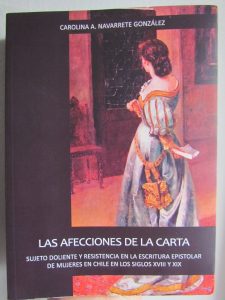  |
The Liu Institute for Global Issues interviewed Dr. Carolina A. Navarrete, Postdoctoral Fellow at the Latin American Studies program at UBC to learn more about her new book.
What’s the title of your book and what is it about?
My book is titled: “Las afecciones de la carta: Sujeto doliente y resistencia en la escritura epistolar de mujeres en Chile en los siglos XVIII y XIX”, which roughly translates to “The affect of the letter: Sorrowful subject and resistance in the epistolary writing of women in Chile in the 18th and 19th centuries”. As the title suggests, this is a scholarly book centered around the literary strategies employed in the writing of private letters by women in Chile, focusing in how they represent and discover themselves through the act of writing.
How was the process of publishing your book?
During my time as a postdoctoral fellow (2015-2017) at the Latin American Studies program, I was awarded a grant by the Consejo Nacional de la Cultura y las Artes of Chile. Thanks to this funding, I was able to prepare and edit my book during 2017, working very closely with the prestigious Cuarto Propio publishing house in Santiago. This ended up being a lot of work, but also an extremely gratifying experience.
Why did you decide to become part of the Latin American Studies program? How would you describe your experience?
I discovered the Latin American Studies program by following the academic work of its director, Dr. Jon Beasley-Murray; specifically, his internationally recognized scholarly text, Posthegemony. I originally collaborated with Dr. Beasley-Murray on a project regarding digital humanities, in which we sought to create formative videos and conduct interviews with different leading scholars in the fields of Latin American politics, literature, history and others. These videos were then included in the curriculum of the LAST100 course and uploaded to YouTube (please see here) for the benefit of anyone interested in the field of Latin American studies. From this I then moved on to continue my work on women’s writing, focusing on the phenomenon of displacement and how it has affected indigenous women in Chile.
I would say my experience has been tremendously enriching and rewarding.
How does your book relate to the Latin American Studies program at UBC?
The main focus of my book is the importance of the feminine voice from her own point of view throughout history. In this book, I recover several valuable historical documents which include not only the letters of the two main women I study, Sor Josefa de los Dolores y Peña y Lillo and Carmen Arriagada, but also letters from several other important Latin American women from different time periods, ranging from the 16th to the 19th century.
History, as we all know, has been usually transmitted by male-approved channels; prominently, though books in which the feminine presence tends to be relegated to minimum anecdotes or highlighted following male standards. My intention with this book is to put forward the historical importance of female writing from its own standpoint, highlighting its relevance not only in literary history, but also, as part of the construction of the Latin American society as whole.
Through the study of emotions and affects in the letters, it’s possible, I posit, to discover ways of thinking and feeling which are unique to the feminine Latin American sensibility, which, in turn, allow us to discover cultural, political, and societal aspects of the period and territory from a fresh and renewed perspective. This approach, I think, benefits the field of Latin American studies greatly.
Would you recommend the Latin American Studies program at UBC? Why?
I would absolutely recommend it. The Latin American Studies program at UBC is a leading multidisciplinary program that seeks to unite Canada and Latin America, and its director, Dr. Jon Beasley-Murray, has been and continues to be extremely effective in achieving this goal by helping spread research about several subjects relevant for the territory and by organizing round tables and presentations all throughout the year with leading international scholars in the field. These sessions are especially beneficial for everyone involved, since they’re organized in such a manner that anyone interested in the wide range of topics the program covers (economy, social justice, politics, philosophy, literature, etc.) can participate, give feedback and voice their opinions.
I would also like to mention the Latin American and the Global group at the Liu Institute for Global Issues, coordinated by Juan Felipe Hernández, which conducts periodical meetings in which several key and current Latin American issues are presented and discussed in a multidisciplinary and academic environment.
Both instances, I believe, help disseminate research conducted at the university by our colleagues and peers which is why I believe they are a valuable part of UBC as a whole.
What are some of your future projects?
I will keep on working on women’s writing, but this time in the field of poetry, particularly, indigenous poetry. I’m currently preparing an essay which deals with the phenomenon of displacement and territoriality in female Mapuche poetry during the 20th century in Chile.
How can we acquire your book?
My book can be purchased worldwide through buscalibre.com.
Postscript:
Join Carolina Navarrete at her book launch on Nov. 29, presented by The French, Hispanic, and Italian Studies Research Seminar.
With discussants:
Kim Beauchesne
Jon Beasley-Murray
Bill French
Wednesday, November 29, 2017,
3:00 pm – 4:30 pm
FHIS Departmental Lounge
7th Floor, Buchanan Tower
All welcome. Contact jon.beasley-murray@ubc.ca or jculbert@mail.ubc.ca


